
The acclaimed war correspondent Anjan Sundaram joins us to discuss the state of conflict reporting and why some of the world’s deadliest wars go unreported. We cover conflict in the Central African Republic, the Democratic Republic of the Congo and Rwanda, as well as the future of the international media economy. Due in part to the lingering “colonial” structure of global media, Sundaram says, “these enormous wars, some of the biggest in our world today — and some of the greatest since World War II — are still relatively underreported in the international news.”
Transcript
AMY GOODMAN: This is Democracy Now!, democracynow.org, The War and Peace Report. I’m Amy Goodman, with Nermeen Shaikh.
We turn now to look at why some of the world’s deadliest wars go unreported. That’s the headline of a recent piece by the acclaimed Indian war correspondent Anjan Sundaram. He writes, quote, “Despite the world’s technological advances, conflicts like the one in [the Central African Republic] are still shrouded in darkness, and we often don’t know the perpetrators, who is attacked, or why.
“The neglect of such war zones is the consequence of an international news system still structured by colonial relationships. Foreign correspondents fly out from global capitals such as Washington, D.C., and London, more or less to similar places at similar times, to tell us more or less the same stories.”
That’s Anjan Sundaram reporting in Foreign Policy, joining us now from Mexico City. He recently published his third memoir about life as a war correspondent, titled Breakup: A Marriage in Wartime. His recent opinion piece published on the front page of The New York Times about the Rwandan President Paul Kagame, who he calls the West’s most beloved dictator, is headlined “Reducing Rwanda to Tyranny.”
Anjan, thanks so much for joining us today. If you can lay out that piece that you just wrote, “Why the World’s Deadliest Wars Go Unreported”? Why?
ANJAN SUNDARAM: Thank you, Amy and Nermeen, for having me.
Indeed, I can illustrate, you know, that lack of reporting through a story in the Central African Republic. I was traveling in the west of the country with a Polish abbot, a priest, and we drove through a rebel zone where the government had destroyed radio antennae, so we couldn’t get news from the region. And as we drove in the abbot’s white pickup, we stopped at village after village, and each village deserted because they had abandoned their homes, thinking that maybe we were the government come to ambush them or attack them. The abbot honked, and someone would run out of the forest or run out of some hiding spot and thrust a piece of paper through our window. And on that piece of paper that fell into my lap, I would find a list of names of people who had been attacked, who were hungry, who were sick, who needed medicine. And we would take these pages back to the capital, to the main city of the region, as a form of war correspondence.
And, you know, it’s striking that in this age of, you know, as you mentioned, in my piece, technological advancement, of us being inundated with information, that this is how news from war zones is still collected, by hand, by the brave action of, you know, one priest, one person. And I think that’s very striking because it tells us that though we imagine that we cover the world well, the international news covers the world well, there are these enormous blind spots in places like the Central African Republican or the Democratic Republic of Congo, where nearly 6 million people have died since — been killed in the war since 1996. And these enormous wars, some of the greatest, you know, in our — the biggest in our world today, and some of the greatest since World War II, are still relatively — you know, still pass relatively unreported in the international news.
NERMEEN SHAIKH: Talk about the Central African Republic, because that’s the subject of your book, Breakup, which is just out, came out a couple of months ago. You said you spoke to many people in the Central African Republic while you were reporting, and you said that the first thing people asked you was not for food or medicine, but if people knew outside what was happening in the Central African Republic. So, if you could talk about that, what people said to you, and why it’s so important that their stories get out?
ANJAN SUNDARAM: Absolutely. And I think another striking quote was from my reporting partner, Thierry Messongo, a journalist in — a Central African journalist. We were sitting down once, and we were looking up at the moon. And he said to me, “I think people know more about the moon than they know about this, what’s happening in my country.” And I think, you know, there’s a lot of truth in that.
The war in the Central African Republic was initiated in 2013 by a group of mostly Muslim rebels from the northwest. And people have forgotten the history of the Central African Republic. But before it was a French colony through the 1900s, there were powerful Muslim sultanates who ruled over that territory, and the French defeated them. The French defeated a very powerful sultanate called the Dar al-Kuti, which means “the door to the forest,” and a sultan named Rabih az-Zubayr. And after the French took over, people forgot about those Muslim kingdoms, but the Muslim populations of that region have not forgotten. And in 2013, they made a bid for power and to reclaim the glory that they had lost to the French. And though, you know, they took over the country briefly, they were defeated again. And unfortunately, that defeat led to the ethnic cleansing of Muslims in the Central African Republic. The Muslim population of the country was reduced from roughly 15% of the country to about 9%, by some accounts, so an enormous, enormous, you know, hundreds of thousands of people, of Muslims, cleansed from the country. And the number of dead in that war has still not been properly counted.
But what it tells us, what the Central African Republic tells us, is that many, many countries are looking back to their pasts, before the West ruled over them, and looking back to — and looking to reclaim their identities and past glory. And though this rebel group, they took power only briefly, they did succeed in pushing out the French. And this created a void in the Central African Republic that has been filled by Russia. So, as I mentioned earlier on in the segment, Russia’s notorious Wagner Group is now active in the Central African Republic. A U.S. diplomatic cable leaked earlier this year pointed out that the Wagner Group is mining millions, hundreds of millions possibly, of dollars’ worth of diamonds and gold that it is using to recruit and buy equipment to finance its war in Ukraine. And so, you know, it tells us that countries like the Central African Republic are so desperate to turn away from the West and turn away from Western colonial crimes, for which the West has rarely apologized, that it is willing to ally with Russia, China, and even at the cost of furthering the war in Ukraine.
NERMEEN SHAIKH: Anjan, can you talk about the fact — you know, what you think needs to happen, how it is that these wars can receive the coverage that they more than warrant? You’ve called for a multipolar news world. How is it that countries in the Global South itself, newsrooms, can report on conflicts in the Global South without going through London or New York?
ANJAN SUNDARAM: Sure. So, I did my Ph.D. research on this topic, on postcolonial news. And one of the things that I elaborated was the colonial structure of international news. We still have correspondents flying out from global capitals, Western capitals mostly, like New York and London, to report on the “peripheries” of the world and bring us back information, you know, and then winning the prizes and the recognition in the West, often using work and reporting that local reporters have worked for years on in the peripheries. And so there’s still much colonialism in the international news structure.
But I think, you know, instead of continually blaming the West and criticizing the West for not caring enough about places like the Central African Republic and the Congo, which to some degree is understandable — these places are so far away from the West, why put all the burden on Western media? — I want to ask why wealthier Global South nations, such as Nigeria and Kenya and India, don’t do more to report on places like the Central African Republic and the Congo, and even conflicts nearby them. You have — if you open the newspapers, you know, the international pages of newspapers in many of these Global South countries, you’ll find most of the international news is sourced from the BBC and Reuters. And why is that? You know, Nigeria and India are now middle-income countries. Their wealth is rising very quickly. They have vibrant media sectors. Why don’t they care more — and, you know, I’m from India, so why don’t we care more about our neighboring countries? Why do we rely on The Guardian or the BBC to bring us news about countries that are a couple of hundred kilometers away from our border? And that’s the question I really want to ask. I want to put the onus back on the Global South and ask — you know, as we rise to levels of greater economic prosperity, there comes a responsibility also to report on the world, to cast and share our perspective, the Global South’s perspective, on many of these wars, and to stop, you know, criticizing Western media and Western nations for not caring enough.
AMY GOODMAN: Anjan Sundaram, can you talk about your decision to go to the Democratic Republic of Congo, and also, in explaining what’s happening there, how that links to the piece that you wrote about the brutal dictator, Paul Kagame? Your headline, “He’s a Brutal Dictator, and One of the West’s Best Friends.”
ANJAN SUNDARAM: Absolutely. So, when I showed up in the Congo — this was about 15 years ago — I was studying mathematics at Yale, Yale University. I had a job at Goldman Sachs to work as a mathematician there. And I opened the newspaper one day at lunch time, and I turned to the middle of the newspaper, bottom of the page. There was a little story about how 4 million people, back then, had been killed in the Congo War. And it struck me how that little story wasn’t on the front page. Four million people, that’s a huge number. And from there, I began to research and understand more about the war in the Democratic Republic of Congo. And when I was paying my final bill at Yale, the cashier happened to be from Congo. And I ended up staying with her in-laws in Kinshasa, the capital of the Democratic Republic of Congo. And from there, from this inside perspective, living with a local family instead of living in a hotel, I began to report on the country. I bought a one-way ticket to Kinshasa, lived with that family and began to report on the country.
And it was, for me, a remarkable education in journalism, because every day the stories that I published for the Associated Press, for whom I became a stringer — and this whole experience, I recount in my first book, my first memoir, Stringer: A Reporter’s Journey in the Congo. Every day, the news that I published, you know, was then criticized by my neighbors on the street. I would go and drink beer with them or by cellphone credit in the evenings, and they would scold me and tell me how my reporting was helping or hurting their country, and holding me accountable at a street level, which is a rare experience as an international reporter. Usually we find ourselves living in, you know, nice hotels, dining with local politicians and the elite of the country. And here I was, being held accountable by very ordinary, very middle-class, lower-middle-class people, who are living almost in conditions akin to a slum. And that was a particular experience of reporting and education. That’s how I learned about international reporting.
From the Congo, I then moved to Rwanda, the subject of my recent New York Times article. I went to Rwanda to teach a class of about a dozen Rwandan reporters. And they were taken out by the government and by the president, Paul Kagame, one by one. So, a colleague was shot dead on the same day he criticized the president. I showed up at his funeral, and his wife was holding their little infant child. And very few journalists dared even to come to that funeral, because they were scared of being associated with him. And, you know, other journalists in my class —
AMY GOODMAN: Anjan, I hate to say this, but we have 30 seconds, so I want to give you a chance to wrap up, but we’re going to continue this conversation after the show and post it at democracynow.org. Your final comments on this?
ANJAN SUNDARAM: Sure. So, you know, my report and my book, Bad News: Last Journalists in a Dictatorship — that’s my second book — is about how President Paul Kagame shut down the press in Rwanda, you know, not only my class, but the press in the country, and describes the journey a country goes through as it’s being silenced and as dictatorship and authoritarianism takes hold, a process that we are seeing in many countries around the world, not just in Rwanda today.
AMY GOODMAN: Anjan Sundaram, award-winning journalist and author of the latest book, Breakup: A Marriage in Wartime. We’re going to do Part 2 at democracynow.org. I’m Amy Goodman, with Nermeen Shaikh.

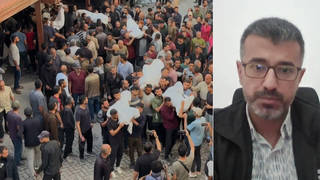
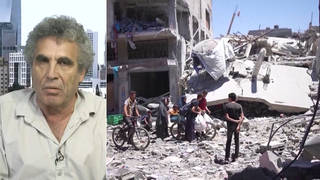
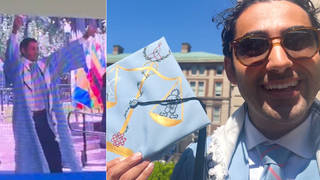

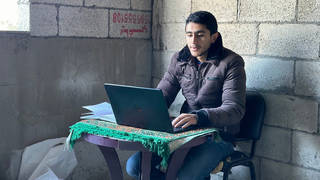
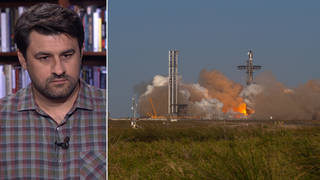




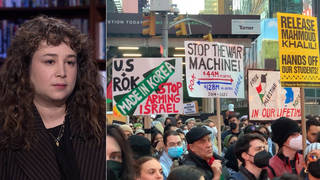
Media Options